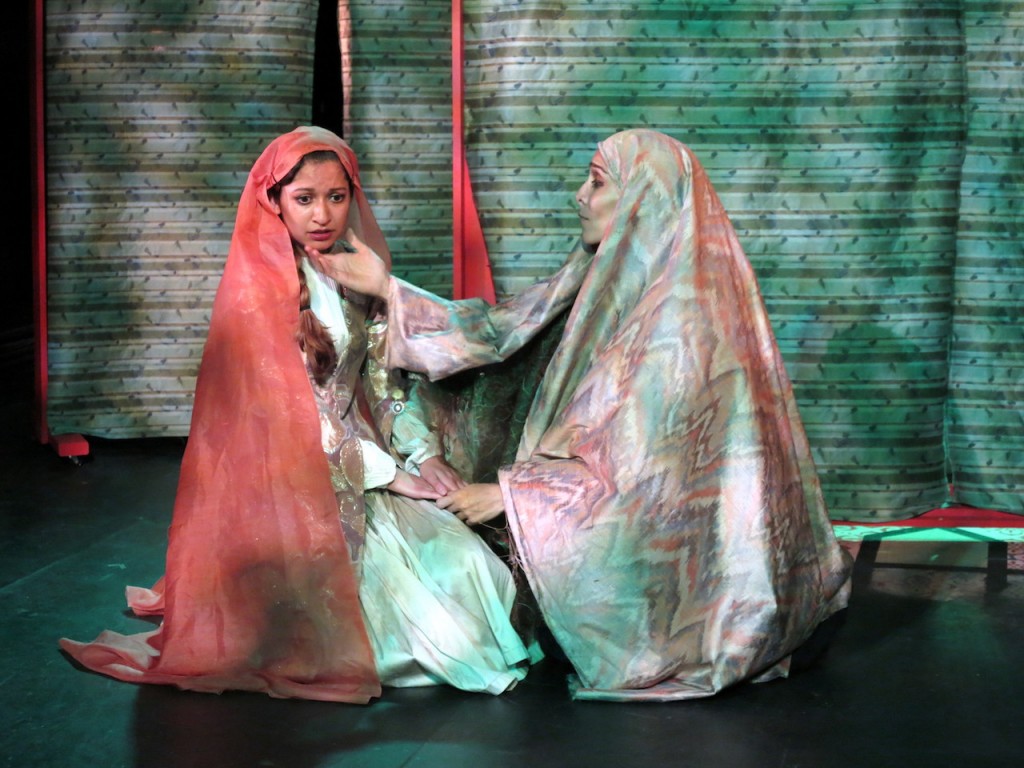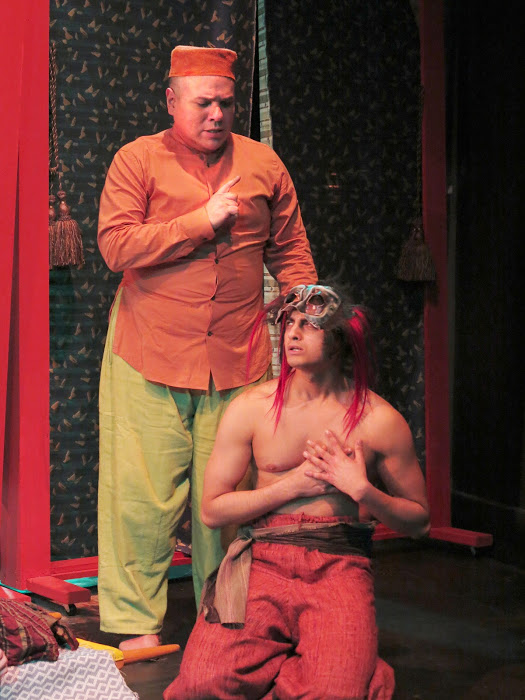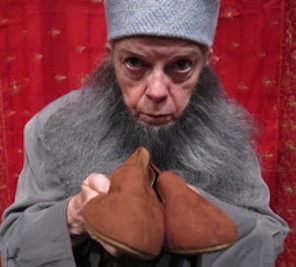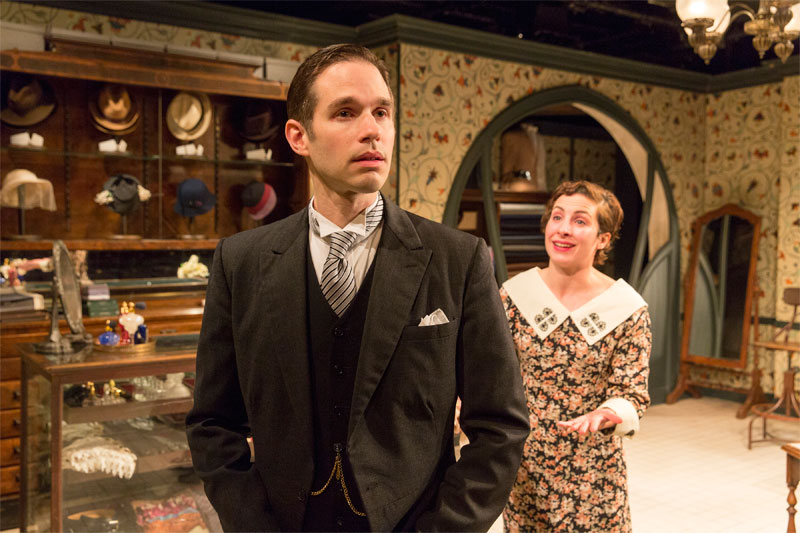

by Sophia Romma
August Strindberg Rep is currently presenting a performance of the folkloric tale of Abu Casem’s Slippers at The Gene Frankel Theater—a piece that revolves around greed. Abu, played by a frail-voiced Mary Tierney, is rapacious, grasping at hidden stolen riches. At the onset, the orange lights dim as tantalizing Middle Eastern music strikes a wishful chord. A monkey appears and jumps amid the audience members in a playfully seductive yet conniving manner. We learn that there once was a wealthy merchant named Abu Casem who lived in Baghdad. Abu was infamous for his stinginess and for bathing only once a year. He confesses, “No one should ever look down on money, it provides one with food, clothes and slippers—a gift from the heavens.” When it was Abu’s birthday, it was the day of his annual bath, so he made his way to the bathhouse. Abu, cleansed and purified, wished for a new pair of slippers; but, since he had short arms and long stubborn pockets, he refused to buy a new pair. So, he rolled out his prayer mat and beseeched Allah for a gift. Meanwhile another rich merchant approached the bathhouse, sniffed out Abu’s pungent slippers, ordered the bath attendant to move those slippers out of view and removed his own slippers. Abu, dripping with hope, admired the red slippers and, believing that his prayers had been answered, stole the rich merchant’s slippers. Thus this adventurous moral concoction unfolds in uncounted primitive iambs and “free verse.” While this theatre piece is proclaimed in the program as “a fairytale for old and young children,” it is heartless to declare rhythm where rhyme is vocalized in cinematic jump cuts, leaving the audience hanging off anticipation’s cliff. Albeit, this handicapped production could have been an alluring spoof on the rendition of lurid Arabian Nights. Perhaps the saucy poetic words of August Strindberg chime better in German and Swedish—but sadly, the stale verse of this tale leaves an unsavory taste on an eager discriminate spectator’s palate.


There are uplifting moments in Abu Casem’s Slippers (directed by Janet Bentley) though, reminiscent of reading Ray Bradbury’s dark fantasy novel, Something Wicked This Way Comes. The mystique of the banks of the Tigris-Euphrates running through Baghdad, leaves us breathless. The narrow stage bursts in Technicolor reveries of wild terraces with overflowing fountains (Set: You-Shin Chen). Strindberg expands this tale with engaging love scenes laced with melancholy between Abu’s daughter who stifles her passion due to an untimely prophetic dream and a prince with a golden madrigal voice who is enthralled by her charm. Hassan, delightfully played by the animated actor, Kevin Vavasseur, is enchanting as he spurts out words of wisdom at Abu: “Fate has his victory stamped on Casem’s face.” The Merchant Ahmed, portrayed in a flamboyant manner, by the boisterous Oliver Conant, sets the moral tone of the play, as he parts from his son in order to provide a better life for his family. Meanwhile Hassan and the Nurse, played by Pooya Monseni, who lends her authentic stage presence, sing out pebbles of wisdom. We find our handsome Prince Guri Bather haunted by malady. Hassan walks alone on a dangerous path and as the monkey appears preaching of nightmares unveiled, Hassan swears to the audience that he is a fine craftsman and shall solve this fairy nightmare. The Nurse comforts Hassan: “Allah is great and shall smitten what his hand shall later heal!”
Unbeknownst to Abu, he searches for a cure for avarice—enduring turbulent trials. The slippers which at first seemed so promising have nearly led to Abu’s demise. With his poetic words, the Prince proves that love is a curse—then plop, a plot twist—he supposedly receives a note from his beloved but it’s a plan hatched by Hassan to draw the two lovers together.
Hassan and the Nurse remind the audience that “where human hearts speak, even the beast is silent.” Abu obtains his chance to embrace his son in law, the prince, as Hassan breaks the curse of the menacing dream of the falcon who purportedly stole the finch. Abu’s lovely daughter, Suleika, played by the refreshing Jaya Tripathi, was simply weary of deceitful love. All’s well that ends well as Abu sheds his wretched slippers and Hassan proves to Suleika that: “There was no treason in her dream! The finch returned to save his mate. The bird was absent for a perfect reason.”
The Caliph judges Abu fairly: “Abu is not a miser who collects only money. He works for his daughter, not for sumptuous dress—he gives all others wine but he himself drinks water! Right is right and always shall be.”
Abu Casem’s Slippers. Through December 3 at the Gene Frankel Theatre (24 Bond Street, between Lafayette and The Bowery). www.genefrankeltheatre.com
Photos: Jonathan Slaff






















